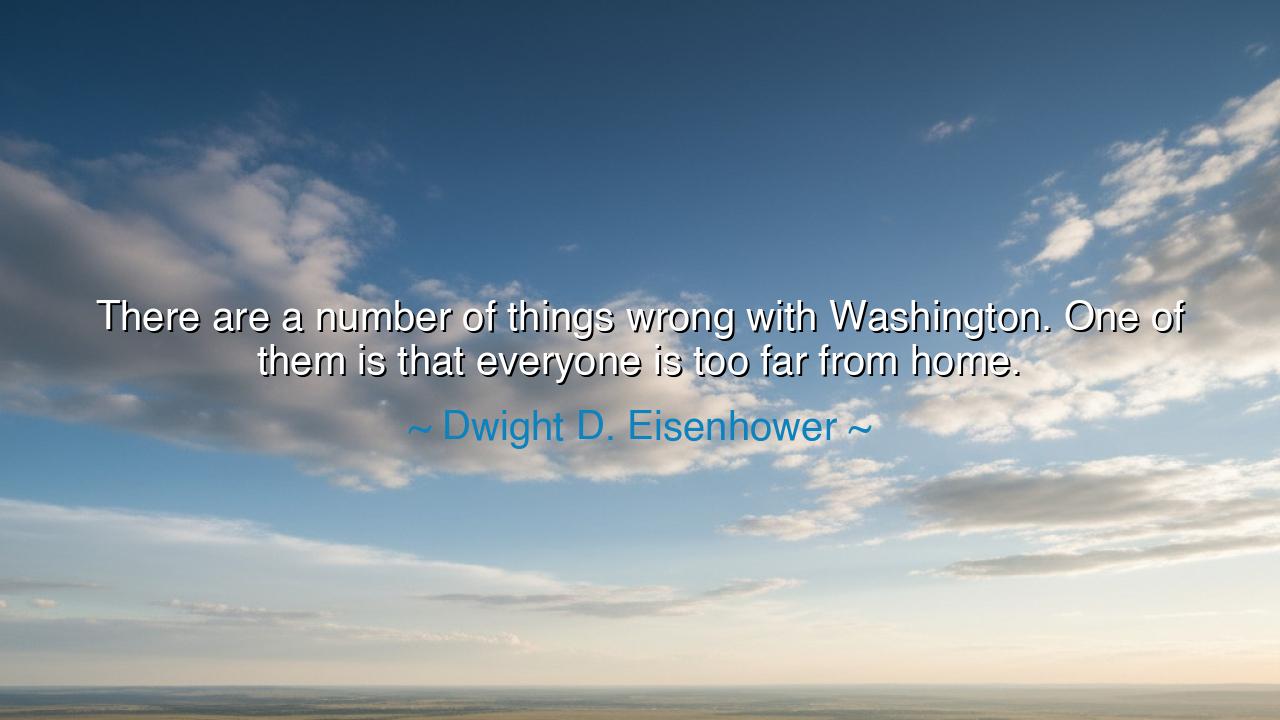
There are a number of things wrong with Washington. One of them
There are a number of things wrong with Washington. One of them is that everyone is too far from home.






The great general and president Dwight D. Eisenhower once said, “There are a number of things wrong with Washington. One of them is that everyone is too far from home.”
In these words lies not merely a critique of politics, but a lament for the loss of grounding, the slow drift of leaders away from the people they serve, and the forgetting of the simple virtues that shape a nation’s soul. Eisenhower, a man of the soil and of service, understood that power without remembrance is corruption, and ambition without humility is decay. To be “too far from home,” in his meaning, is not only to live distant from one’s birthplace, but to be estranged from one’s roots — from honor, community, and the quiet wisdom of ordinary life.
The origin of this quote arises from Eisenhower’s lifelong contrast between the clarity of the battlefield and the confusion of political halls. Having led men through the crucible of World War II, he had seen courage, loyalty, and sacrifice in their purest form — men fighting not for status, but for their comrades, their families, their homes. But when he entered the capital as president, he found a different kind of struggle — one driven by ego, ambition, and ideology. To him, the sickness of Washington was not merely corruption or greed, but disconnection. Lawmakers, officials, and bureaucrats had lost touch with the common people — with the farmers, laborers, and families whose sweat sustained the republic. They lived among marble pillars, but had forgotten the fields and towns from which their authority sprang.
In the ancient world, the wise also warned against the dangers of this estrangement. The philosopher Confucius taught that the ruler’s virtue was like the wind, and the people like grass — that if the ruler bent toward righteousness, the people would follow. But he also said that a ruler who forgot his roots, who lived too far from the heart of his people, would bring disorder to the realm. Similarly, Plato, in his Republic, wrote that the decay of a city begins when its leaders seek comfort over duty. The lesson of both sages, like Eisenhower’s, is eternal: power must always remain close to the earth — to the wisdom of home and the truth of those who live by honest toil.
There is a story, too, from Eisenhower’s own life that reveals this truth. Born in Denison, Texas, and raised in Abilene, Kansas, he grew up among the hard-working people of the Midwest — those who prized duty, simplicity, and honor. Even as Supreme Commander of the Allied Forces, he never forgot the lessons of that small town: that leadership is service, and that greatness is humility in motion. When he later entered the White House, he filled his days with the remembrance of home — hosting picnics, painting landscapes, and tending to his farm in Gettysburg. But even he saw how those around him — senators, advisors, and lobbyists — lived detached from the pulse of the land, speaking of the people as abstractions rather than as living souls. To them, America was a system; to Eisenhower, it was a family.
The phrase “too far from home” can thus be heard as both literal and symbolic. It speaks of physical distance, yes — of men and women drawn from every state, who forget the roads that once shaped their character. But deeper still, it speaks of moral distance: of how one’s sense of purpose and compassion can fade amid the noise of politics. When the heart of leadership forgets the hearth of home, decisions become cold, and governance turns mechanical. The leader who remembers where he came from governs with empathy; the one who forgets governs with arrogance. In this sense, Eisenhower’s words are not only about Washington, but about every heart that strays too far from its own source.
History offers countless warnings of what happens when leaders lose their connection to their roots. The Roman Senate, once filled with statesmen who tilled their own fields, became a nest of elites who ruled from marble halls, untouched by the struggles of the common man. Rome, detached from its moral foundations, began to crumble from within. In contrast, those leaders who stayed close to the earth — Abraham Lincoln, who spoke of the plain people; Mahatma Gandhi, who spun his own cloth; Nelson Mandela, who never ceased to see himself as a servant of his people — found their strength not in luxury, but in remembrance. Home is not merely a place; it is the anchor of integrity.
So, my child of the present age, take heed of Eisenhower’s wisdom: never stray too far from home. Whether you rise in power or wander in ambition, remember the soil that shaped your hands, the values that molded your heart, and the faces that trusted you to do right. The world will tempt you with comfort and pride, but the heart grows cold when it forgets its origin. Stay close to the people, listen to their voices, and let their struggles guide your purpose.
For in the end, home is not just where you begin — it is what keeps you true. To forget it is to drift into confusion; to remember it is to walk in strength. And so, as Eisenhower reminds us, the cure for what ails not only Washington, but all of humanity, lies in this ancient truth: those who remain faithful to their roots shall never lose their way.






AAdministratorAdministrator
Welcome, honored guests. Please leave a comment, we will respond soon